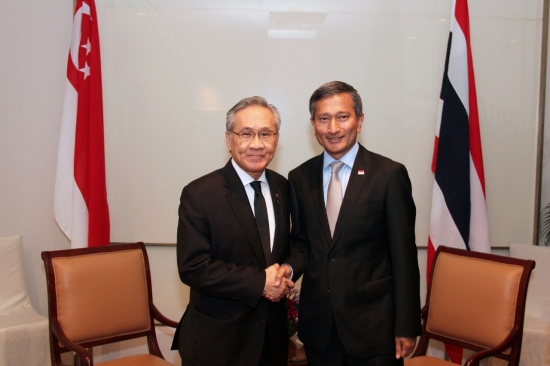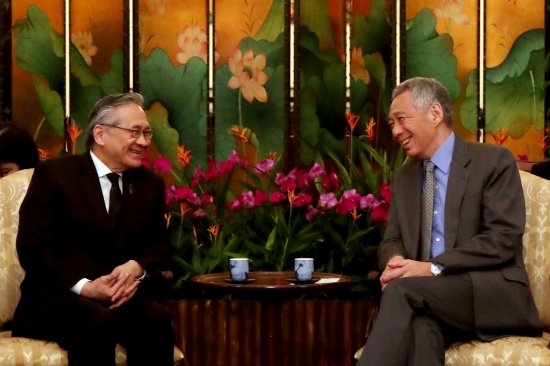22 Aug 2017
Minister of Foreign Affairs of the Kingdom of Thailand Don Pramudwinai visited Singapore at the invitation of Minister for Foreign Affairs Dr Vivian Balakrishnan, and in conjunction with the 13th Coordinating Meeting of the Thailand-Singapore Civil Service Exchange Programme (CSEP13).
On 22 August, Minister Don called on and was hosted to lunch by Minister Balakrishnan. They reaffirmed the excellent, and longstanding ties between Singapore and Thailand. Our relations are multi-faceted, with substantive cooperation in many sectors, including defence, the economy and tourism exchange. Both Ministers also discussed international and regional developments, such as cooperation in ASEAN. As founding members of ASEAN, Singapore and Thailand share common strategic interests in preserving the unity and centrality of ASEAN and working towards peace and stability in our region. Minister Don expressed Thailand’s support for Singapore’s ASEAN Chairmanship next year.
Minister Don also made a courtesy call on Prime Minister Lee Hsien Loong in the afternoon, during which they exchanged views on social policies, including health and education, as well as Singapore’s Smart Nation initiative. Minister Don conveyed an invitation from Prime Minister Prayut Chan-o-cha to PM Lee to visit Thailand for the next Singapore-Thailand Leaders’ Retreat.
Minister Balakrishnan and Minister Don jointly officiated the Opening Ceremony of CSEP13. CSEP is a bilateral mechanism conceived as part of the strategic partnership established between Singapore and Thailand in 1997, and is a platform for discussion across 13 cooperation clusters.[1]
CSEP13 was co-chaired by Mr Chee Wee Kiong, Permanent Secretary of the Ministry of Foreign Affairs of Singapore, and Mrs Busaya Mathelin, Permanent Secretary of the Ministry of Foreign Affairs of Thailand. Both sides recognised that the theme for CSEP13, “An Enduring Partnership for a New Age”, is timely. Singapore and Thailand are each pursuing innovation and technology through our respective Smart Nation and Thailand 4.0 initiatives, to create opportunities and improve the lives of our peoples. There is much we can learn from each other.
Both sides further noted that across the CSEP clusters, there have been robust exchanges through study visits, including in the legal and judicial; media, arts and culture; civil service; environment; transport; health; manpower; and social, welfare, youth and sports clusters. Both sides are especially encouraged by the strong cooperation in the area of water and air quality management. In addition, our educators have had many opportunities to exchange best practises through annual school exchanges, camps, and retreats. Of note, an MOU on enhancing the capability of Thai teachers to deliver STEM (Sciences, Technology, Engineering and Mathematics) education in Thailand was concluded in February 2017. In line with the trend of a growing digital economy, the Information and Communications Technology cluster also signed an MOU on cybersecurity cooperation in May 2016. There are also opportunities to explore further collaboration in the Science and Technology sector.
CSEP13 involved nearly 100 delegates from over 30 agencies across Singapore and Thailand. The Singapore agencies represented were the Public Service Division; Civil Service College; Ministry of Education; Ministry of Environment and Water Resources; Ministry of Health; Ministry of Communications and Information; Infocomm Media Development Authority; Ministry of Law; Supreme Court of Singapore; State Courts of Singapore; Ministry of Foreign Affairs; Ministry of Manpower; Ministry of Communications and Information; Ministry of Culture, Community and Youth; Agency for Science, Technology and Research; Ministry of Social and Family Development; Singapore Sports School; Ministry of Transport; and the Maritime and Port Authority of Singapore.
. . . . .
MINISTRY OF FOREIGN AFFAIRS
SINGAPORE
22 AUGUST 2017
[1] The 13 CSEP clusters are: (i) Civil Service; (ii) Education; (iii) Environment; (iv) Health; (v) Information and Communication Technology; (vi) Legal and Judicial; (vii) Manpower; (viii) Media, Arts and Culture; (ix) MFA-to-MFA Cooperation; (x) Science and Technology; (xi) Social Welfare, Youth and Sports; (xii) Technical Cooperation; and (xiii) Transport.

